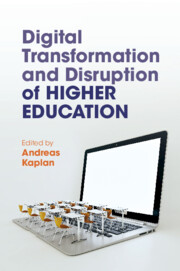Book contents
- Digital Transformation and Disruption of Higher Education
- Digital Transformation and Disruption of Higher Education
- Copyright page
- Contents
- Figures
- Tables
- Contributors
- Preface
- Chapter 1 Nothing Is Constant Except Change
- Part I (R)evolution of the Higher Education Sector
- Part II Changes in Teaching Formats
- Part III Changes in Teaching Content
- Part IV Networking and Social Activities
- Part V Certification and Diplomas
- Part VI Careers and Professionalisation
- Part VII Futuristic and Ultramodern Higher Education
- Part VIII Higher Education in Motion
- Editor’s Biography
- Index
- References
Chapter 1 - Nothing Is Constant Except Change
Academia’s Digital Transformation
Published online by Cambridge University Press: 09 June 2022
- Digital Transformation and Disruption of Higher Education
- Digital Transformation and Disruption of Higher Education
- Copyright page
- Contents
- Figures
- Tables
- Contributors
- Preface
- Chapter 1 Nothing Is Constant Except Change
- Part I (R)evolution of the Higher Education Sector
- Part II Changes in Teaching Formats
- Part III Changes in Teaching Content
- Part IV Networking and Social Activities
- Part V Certification and Diplomas
- Part VI Careers and Professionalisation
- Part VII Futuristic and Ultramodern Higher Education
- Part VIII Higher Education in Motion
- Editor’s Biography
- Index
- References
Summary
The COVID-19 pandemic resulted in a change in mind-sets in many university leadership teams and faculty members worldwide, previously somewhat vulnerable to the sector's digitalization. Academia proved capable of flexibility, going beyond their reputation of being change-averse, moving entire curricula online within days. Yet, to benefit from higher education's digitalization, propelled by the pandemic, future pedagogical innovation is vital so as not to make other sectors' errors of merely transferring the offline into the online world. Moreover, higher education will need to find responses to several (further) academic, budgetary, legal, and operational issues induced by the sector's digital transformation, potentially leading to its disruption. However, higher education also must evade false ideas such as believing that physical buildings will become redundant due to academia's digitalization: On the contrary, facilities will be more critical than ever.
Keywords
- Type
- Chapter
- Information
- Publisher: Cambridge University PressPrint publication year: 2022
References
- 1
- Cited by



